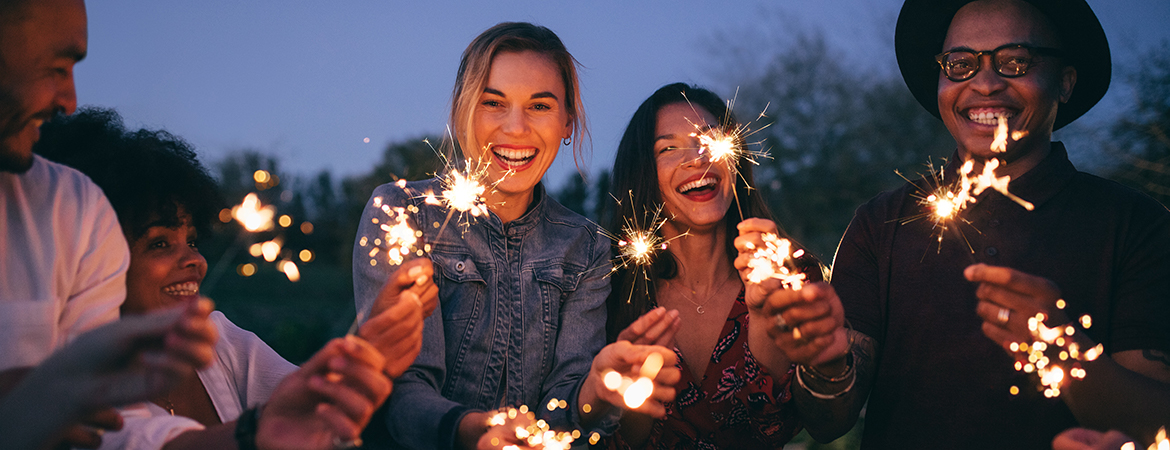Fireworks safety: 4 keys to having a dynamite Fourth of July
There’s no doubt that fireworks are fun, but they’re also the culprit of more than 10,000 hospital visits in the U.S. each year.

Bottle rockets, Roman candles, and sparklers are all synonymous with one thing in America: the Fourth of July. There’s no doubt that fireworks are fun, but they’re also the culprit of more than 10,000 hospital visits in the U.S. each year. This holiday should be a celebration of our country’s independence, not a reason to go the emergency room. Educate yourself on the rules and risks of fireworks before embarking on your own backyard pyrotechnics show.
- Handle with care.
Each year, thousands of celebrations fizzle out early due to injuries. Mishandled fireworks can result in severe burns, fractures, disfigurement or, worse yet, death. Even a sparkler, usually handed to small children and thought by many to be harmless, burns at 1,200°F. To put that into perspective, wood burns at 575°F and glass melts at 900°F. The tip of a sparkler is hot enough to easily cause third degree burns, thus accounting for more than one-fourth of emergency room fireworks injuries.
Follow these tips to keep you and your family safe while handling fireworks:
- Buy your fireworks from a licensed dealer and read all instructions before lighting. Don’t experiment with homemade fireworks. Sure, they might provide a few seconds of enjoyment, but that’s not worth the risk of injury, scarring or even death that may occur as a result.
- Alcohol and fireworks aren’t a good recipe. Choose an adult who is not consuming alcohol to be the designated fireworks handler.
- Always supervise the kiddos! The risk of fireworks injury is highest for young people ages five to nine.
- Keep a bucket of water on hand and make sure there’s a water hose connected nearby.
- Douse the duds! Wait 20 minutes after attempting to light a dud and soak it in a bucket of water. Never try to relight fireworks that don’t work the first time around!
- Light one firework at a time.
- Never point fireworks at people.
- Keep a safe distance when watching fireworks.
- Light the sky, not your property.
It’s not uncommon for fireworks to send wooded areas, homes and automobiles up in flames. Fire departments annually respond to an average of 18,500 fires caused by fireworks, including 1,300 structure fires, 300 vehicle fires and almost 17,000 outside and other fires.
Fireworks-related fires cause at least $20 million in property loss each year. Bottle rockets or other rocket-type fireworks are an especially large risk to your home, as they can land on rooftops or wedge within a structure while still retaining enough heat to cause a fire.
- Know the law.
A little Fourth of July fun can turn into a run-in with the police in a flash. Laws and ordinances regarding fireworks vary from state to state, and even city to city. To view each state’s fireworks laws by the American Pyrotechnics Association, click here.
- Don’t forget Fido.
While most humans find the earth-shaking boom of fireworks to be enjoyable, most pets do not. In fact, so many frightened pets try to escape the sights and sounds each Fourth of July that lost pet intakes at animal shelters skyrocket. Remember that pets are much more sensitive to the sights, sounds and smells of the holiday than you are. Keep them indoors and away from fireworks displays. If possible, turn on a TV or radio to help drown out the commotion. If your pet seems particularly sensitive to the celebrations, consult a vet who can offer calming techniques and medications to alleviate your pet’s anxiety.
If you keep these tips in mind, your Independence Day celebration will be a blast!
>> At Kentucky Farm Bureau, we’re just as invested in your home as you are. This Fourth of July, light up the sky, not your property! To see a full list of products we insure, click here.
